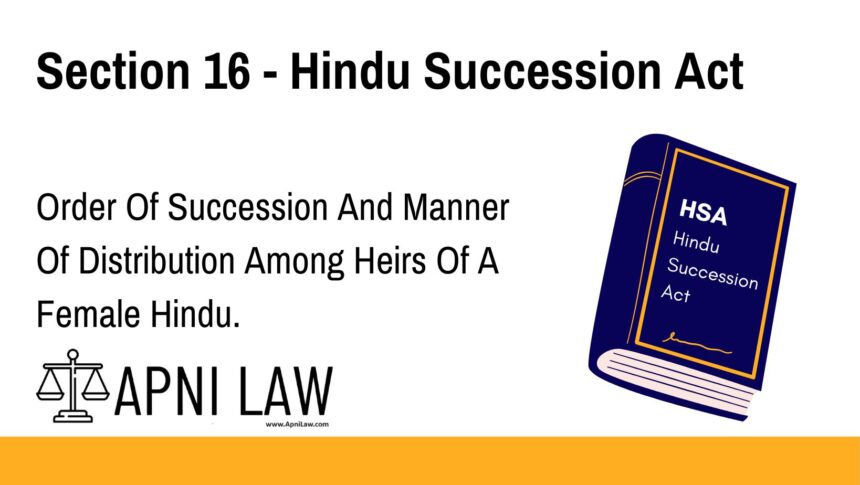Code: Section 16 Hindu Succession Act
Section 16 – Order of Succession and Manner of Distribution Among Heirs of a Female Hindu: The order of succession among the heirs referred to in Section 15 shall be, and the distribution of the intestate’s property among those heirs shall take place according to the following rules:
Rule 1 – Heirs within the same entry (group) are preferred over those in subsequent entries. Heirs in the same group share the property equally.
Rule 2 – If the son or daughter of the intestate pre-deceased her, leaving children, those children will inherit the share their parent would have received.
Rule 3 – The property of the intestate shall devolve upon the heirs listed in clauses (b), (d), and (e) of Section 15(1), and Section 15(2). The devolution follows the same rules as it would if the property had belonged to the father, mother, or husband of the intestate.
Explanation of Section 16
Section 16 outlines the process for distributing the property of a female Hindu who dies intestate (without a will). The section includes three important rules:
- Rule 1 specifies the priority of heirs. Those in earlier entries take precedence over those in later entries. Additionally, heirs in the same entry share the property equally.
- Rule 2 provides for the inheritance of pre-deceased children. If a son or daughter has died before the intestate, their children (the intestate’s grandchildren) will inherit the share that their parent would have received.
- Rule 3 ensures that property is distributed according to the same rules as if it had belonged to the father, mother, or husband of the intestate.
Illustration
Example 1: Equal Distribution Among Heirs
A female Hindu passes away, leaving behind her children (sons and daughters) and her husband. Under Rule 1, the children and husband share the property equally.
Example 2: Inheritance Through Pre-Deceased Children
A female Hindu passes away, and her son had pre-deceased her. The son had two children (grandchildren of the intestate). According to Rule 2, the grandchildren inherit the share their father would have received.
Example 3: Distribution According to Father’s, Mother’s, or Husband’s Property
If the intestate’s property is considered to have belonged to her father, husband, or mother, Rule 3 applies. The property will be distributed as if it had belonged to those relatives.
Common Questions and Answers on Section 16
1. How does the order of preference work among the heirs?
- Answer: Heirs in earlier entries have preference over those in later ones. Within each entry, the heirs share the property equally.
2. What happens if a child of the intestate has passed away before her?
- Answer: The children of the pre-deceased child inherit the share their parent would have received.
3. How is the property distributed if it is considered the father’s, husband’s, or mother’s property?
- Answer: The property follows the same rules as would apply if it had belonged to the father, husband, or mother, ensuring a consistent distribution.
Conclusion
Section 16 of the Hindu Succession Act provides a clear method for distributing a female Hindu’s property after her death without a will. The section ensures that heirs receive their fair share and that descendants of pre-deceased heirs are also considered.








